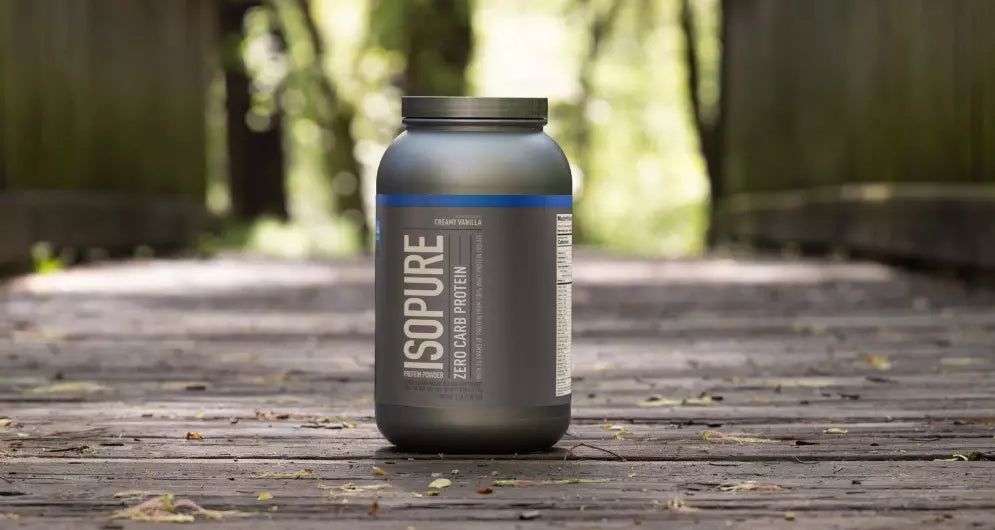ISOPURE: A CLOSER LOOK AT WHEY PROTEIN ISOLATE
What is whey protein? Is there protein whey isolate? If so, what are the differences of whey protein isolate powders? To answer those questions, we need to start at the beginning.
Whey in everyday foods can be traced back thousands of years, but it didn’t gain real attention as a supplement until the 1960s. That’s when athletes started to see its nutritional value for muscle support and recovery. Since then, the use of whey protein supplements has expanded to nutrition-conscious people from all walks of life.
Thanks to advancements in science and technology, the process of producing whey protein products has evolved by leaps and bounds. Today, there are numerous options available, which can make choosing the right whey protein feel overwhelming.
Don’t worry! We’re here to help you understand what whey protein isolate powders are, and why you might want to add them to your routine.
WHAT IS WHEY PROTEIN?
In short, whey protein is found in dairy.
An average cup of whole cow’s milk is predominately made up of water, but also contains about 5% carbohydrates, 4% fat, and 3% protein. From that protein, 20% is whey and the remaining 80% is casein. Since whey is a dairy protein, it can be found in varying amounts among dairy foods like milk, buttermilk, coffee creamers, yogurt, kefir, cheese, cottage cheese, and milk-based desserts like pudding.
WHEY PROTEIN ISOLATE VS. CONCENTRATE
Remember, milk protein naturally contains carbohydrates and fat. Therefore, the main difference you’ll see between whey protein concentrate and whey protein isolate are the levels of macronutrients. In other words, the isolate filtration process removes some of the carbs and fat, and results in a higher ratio of protein.
- Whey Protein Concentrate (WPC) contains higher levels of carbohydrates and fat, because those nutrients have not been filtered out. It contains up to 80% protein by dry weight.
- Whey Protein Isolate (WPI) contains lower levels of carbohydrates and fat, because they are filtered out to isolate the protein. It contains up to 90% protein by dry weight.
Both WPC and WPI are high-quality, complete proteins that naturally contain all nine of the essential amino acids – including the branched chain amino acids (BCAAs) leucine, isoleucine, and valine. Also, both types digest and absorb at similar rates. Additionally, both types are considered fast-digesting proteins compared to casein.
TASTE & TEXTURE
The more whey is filtered, the more carbohydrates and fat are reduced. As a result, the taste and texture of the protein can change. This is because carbohydrates provide a level of sweetness, while fat provides a more cream-like texture. Therefore, WPC has a more decadent, milkshake-like taste and consistency – especially for rich flavors like chocolate, vanilla, and strawberry. On the other hand, WPI will have fewer dairy notes, allowing for refreshing fruit-like flavors like mango, peach, and pineapple.
THE BENEFITS OF WHEY PROTEIN ISOLATE
If you’re wondering why you might choose WPI over WPC, consider your nutrition goals and preferred taste.
- Nutrition Goals: If you want to control your intake of carbohydrates and fats, WPI is a good choice. It’s suitable for many diet types including weight management, keto, and intermittent fasting. Like other complete proteins, it helps support muscle building when taken over time with regular resistance training, muscle recovery, and helps meet daily protein needs.
- Flavor Preferences: If you want a versatile protein but don’t like drinks with a creamy, milkshake-like consistency or flavor, WPI may appeal to your tastes. Since whey protein isolate powders are available in refreshing fruit flavors, it may be a better option to take on-the-go for activities like hiking, cycling, or other pursuits that can have you out and about for some time.
ISOPURE: ADD LESS. DO MORE.
We demonstrate our commitment to purity, simplicity, and quality through our ingredients. From fruit-flavored, on-the-go protein drinks to unflavored powders that boost your favorite recipes, we make it easy to customize your daily nutrition.
What to expect from ISOPURE protein products:
- 100% Pure Whey Protein Isolate
- Zero or Low Carbs
- Zero or Low Fat
- Zero or Low Sugar
- Zero or Low Lactose
- Gluten Free
* ISOPURE protein products are not low-calorie foods





